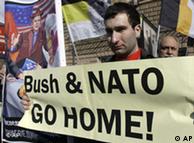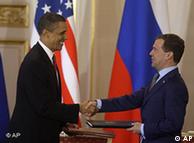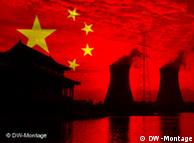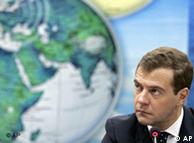****
- Press freedom in Russia takes yet another beating
Russian journalists and civil rights groups are demanding the Kremlin take
action following brutal attacks targeting journalists. Newspaper journalist
Oleg Kashin was severely beaten in Moscow last Saturday. Alleged footage of
the attack was posted online and broadcast on state television. The 30 year
old journalist with the Kommersant business newspaper remains hospitalised.
The DW-WORLD.DE Article
http://newsletter.dw-world.de/
Russia | 13.11.2010
Russia juggles its growing partnerships with the West and China
Flush with cash from booming oil and gas exports, Moscow unilaterally pursued Russian national interests during Vladimir Putin's tenure as president. In the process, Russia's relationship with the West deteriorated to a historic low point.
But then the economic crisis hit. Energy prices collapsed and Russia's rapid growth ground to a halt.
After Dmitry Medvedev assumed the presidency in 2008, Moscow sought to jumpstart the slumping Russian economy through so-called "modernization alliances" with the US and the EU. Yet at the same time, the oil-rich country began consolidating its "strategic partnership" with an oil-hungry China. Russia wanted to pursue its national interests in economic modernization and growth and knew that it needed both the West and China in these endeavors.
Love-hate relationship
Moscow's relationship with the West has a long history of ambivalence. Culturally tied to Europe, yet also influenced by Asia, Russia sits awkwardly between two worlds.
 Bildunterschrift: Großansicht des Bildes mit der Bildunterschrift: Russia's relationship with the West deteriorated as NATO expanded eastward
Bildunterschrift: Großansicht des Bildes mit der Bildunterschrift: Russia's relationship with the West deteriorated as NATO expanded eastward
"The Russians do see themselves more as a part of western civilization," Andrew Kuchins, director of the Russia and Eurasia Program at the Center for Strategic and International Studies, told Deutsche Welle. "They are Eurasian, a power bordering Europe as well as the Pacific Ocean. But the bulk of the population is in European Russia."
With the collapse of the Soviet Union, Moscow seemed to have taken a step toward definitively joining the West. President Boris Yeltsin implemented a series of radical reforms designed to put Russia's political and economic system in synch with its former Cold War enemies.
But as the European Union and NATO rapidly expanded into the former Eastern Bloc, Moscow felt marginalized in its own "near abroad." Then Vladimir Putin came to power. Buoyed by surging oil and gas exports, Putin sought to stabilize Russia domestically and reassert its influence in the former Soviet states.
The developments put the West and Russia on a collision course. In the summer of 2008, they finally collided in the South Caucasus. Russia fought a lightening-quick war against Georgia, a former Soviet republic that has increasingly looked westward. In response to the conflict, NATO severed cooperation with Moscow. But according to Dmitri Trenin, director of the Carnegie Moscow Center, the West also played a key role in the dispute.
"It takes everyone who's involved to organize a better framework for relations," Trenin told Deutsche Welle. "The western policy that included some countries into western institutions and left others such as Russia, but also Georgia and Ukraine beyond the perimeter was very risky. That policy is responsible for the Russian-Georgian War."
Pushing the reset button
Power changed hands in Moscow and Washington in quick succession, bringing new leaders and a new outlook on Russia's relationship with the West. US President Barack Obama and Medvedev saw an opportunity to focus on cooperation instead of confrontation.
 Bildunterschrift: Großansicht des Bildes mit der Bildunterschrift: The US and Russia are now cooperating on common interests
Bildunterschrift: Großansicht des Bildes mit der Bildunterschrift: The US and Russia are now cooperating on common interests
"President Medvedev knows that the modernization of the economy and Russian society cannot be executed without cooperation with the West," Alexander Rahr, director of the Russia and Eurasia program at the German Council on Foreign Relations, told Deutsche Welle.
He said US President Obama didn't want to pursue a policy of containment against Russia.
"He needs Russia in the fight against international terrorism in Afghanistan and Iraq, and he needs Russian support to stop Iran's nuclear weapons program," Rahr said.
As Russian and western interests align, both sides have hinted at moving beyond a quid-pro-quo relationship and bringing Moscow into a deeper security partnership. In the lead up to the NATO summit later this month in Lisbon, Secretary General Anders Fogh Rasmussen has pushed the idea of including Russia in a missile defense shield that would stretch from Vancouver to Vladivostok.
"What Russia and other countries in Europe and North America need to work toward is a Euro-Atlantic security community," Trenin said. "We're not talking about alliances. We're not talking about Russia joining NATO. We're not talking about simply more of the same upgrades of Russia's relations with NATO. What we should be working toward is a state of play in the Euro-Atlantic area where war would not be an instrument of policy."
Eastern horizon
But a Euro-Atlantic security community is not the only game in town. Russia is hedging its bets and forging a strategic partnership with China, as well.
 Bildunterschrift: Großansicht des Bildes mit der Bildunterschrift: China's economic growth is both an opportunity and a concern for Russia
Bildunterschrift: Großansicht des Bildes mit der Bildunterschrift: China's economic growth is both an opportunity and a concern for Russia
"China is second only to the US in terms of countries that weigh in on the Russian strategic mind," Trenin said. "It is immensely important."
China's meteoric growth has made it the world's largest energy consumer. Russia in turn is one of the world's largest energy producers and is therefore well-positioned to fuel China's economy.
The first pipeline connecting Russian oil fields and Chinese refineries was completed last September. It delivers oil from eastern Siberia to northeastern China. Moscow and Beijing are also working together within the Shanghai Cooperation Organization, a loose security partnership designed to combat threats such as separatism, terrorism and extremism.
On the international stage, Russia and China share a similar worldview. They both prioritize national sovereignty and the pursuit of national interests over liberal values, such as democracy and human rights. Yet like Russia's relationship with the West, its growing ties with China face challenges.
"There has always been this certain degree of unease despite all the happy talk and positive rhetoric of Russia and China," Kuchins said. China's rapid growth made the Russians nervous, he said.
"The impact of the (economic) crisis was sort of an acceleration of that trend," Kuchins said. "It leads them to question just how much the growth of Chinese power is good for Russian interests."
Independence or isolation?
As Russia simultaneously pursues partnerships with the West and China, it also wants to maintain its status as an independent power. Moscow has constructed a network of institutions to keep the former Soviet states within its sphere of influence. The Commonwealth of Independent States, the Collective Security Treaty Organization and the Eurasian Economic Community could act as pillars of Eurasian integration.
"The default Russian position is that they would like to be this great superpower," Kuchins said. "There would be the West, Russia and China. But the reality suggests that's not looking to be the case. That forces them to possibly make some harder decisions about just how far they want to push this so-called independent foreign policy."
Russia needs the West for economic modernization, and China presents a lucrative energy market. Yet moving too far too fast in either direction, or striking out on an independent path, could lead to Moscow's isolation.
As a Eurasian power, Russia has little choice but to strike a balance in its relations with the East and the West.
"We have to prepare ourselves for the reality that Russia would like to integrate one leg in Europe and the other in Asia," Rahr said. "If not integration, then it would like to at least work closely with the states of Europe and Asia."
Author: Spencer Kimball
Editor: Sabina Casagrande

沒有留言:
張貼留言